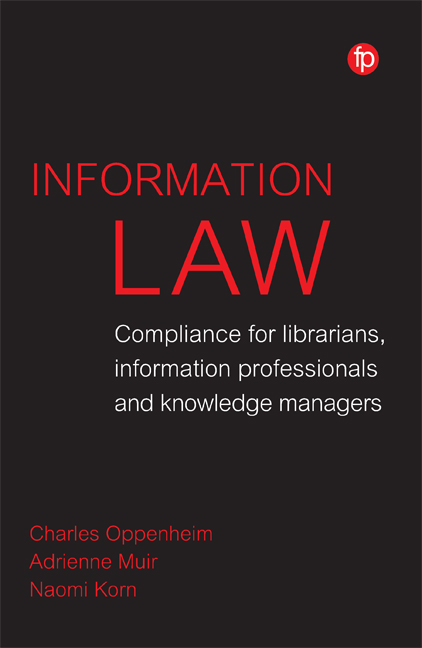Book contents
- Frontamtter
- Contents
- List of Acronyms
- List of Figures and Tables
- List of Case Studies
- Introduction
- 1 Copyright and Related Rights
- 2 Data Protection
- 3 Freedom of Information
- 4 Governance, Audits and Risk Assessment
- 5 Policies
- 6 Procedures: Copyright and Related Rights
- 7 Procedures: Using and Negotiating Licences for Access to Information Resources
- 8 Procedures: Data Protection and Freedom of Information
- 9 Tools and Templates
- 10 Awareness and Engagement
- 11 Some Speculations About the Future
- Appendix 1 Carrying out an Information Asset Audit
- Appendix 2 Sample IP Policy
- Appendix 3 Sample Data Protection Policy
- Appendix 4 Possible Contractual Terms for Online Access to Database Service
- Appendix 5 Data Protection Privacy Notice Template
- Bibliography
- Index
5 - Policies
Published online by Cambridge University Press: 29 July 2020
- Frontamtter
- Contents
- List of Acronyms
- List of Figures and Tables
- List of Case Studies
- Introduction
- 1 Copyright and Related Rights
- 2 Data Protection
- 3 Freedom of Information
- 4 Governance, Audits and Risk Assessment
- 5 Policies
- 6 Procedures: Copyright and Related Rights
- 7 Procedures: Using and Negotiating Licences for Access to Information Resources
- 8 Procedures: Data Protection and Freedom of Information
- 9 Tools and Templates
- 10 Awareness and Engagement
- 11 Some Speculations About the Future
- Appendix 1 Carrying out an Information Asset Audit
- Appendix 2 Sample IP Policy
- Appendix 3 Sample Data Protection Policy
- Appendix 4 Possible Contractual Terms for Online Access to Database Service
- Appendix 5 Data Protection Privacy Notice Template
- Bibliography
- Index
Summary
Introduction
In this chapter, we will cover why it is important to develop policies relating to information law, what a typical policy might contain, what the key areas that should be covered by such policies are, such as risk management, dealing with complaints, consent management, ownership of rights and use of third-party content.
It is not difficult to make the case for the need for formal policies, whatever the size of the organisation or of its LIK management function. LIK workers are likely to be managing copyright and permissions associated with access to print and electronic resources on a daily basis, and are likely to be involved in issues relating to FoI requests and/or data protection issues on a regular or irregular basis. This means that proficiency and awareness of these topics is increasingly a requirement of their skills set. A lack of a basic understanding of copyright and database rights, or of FoI or data protection law, can restrict access to information and resources, could be detrimental to an organisation's ability to maximise the impact and/or exploitation of IPR that it owns, as well as putting the organisation at risk because of its failure to comply with its contractual or legal obligations. Other risks relate, for example, to users or staff copying more than they should, using materials in ways they should not or viewing, sharing or downloading inappropriate/illegal material, or the organisation giving incorrect advice or failing to respond correctly to an SAR or a FoI request.
The key risks for an organisation not getting its policies right, or having appropriate policies but staff ignoring them, are:
◆ breaking the law
◆ more stress and uncertainty than necessary
◆ potential financial penalties
◆ potential damage to reputation
◆ increased pressures on resources
◆ discontented users who no longer make use of the services, cause problems, or bad-mouth the organisation to third parties
◆ job losses/disciplinary procedures
◆ an over-cautious approach, which leads to frustration for others, or failing to grasp opportunities that present themselves. It is clear that the business case for putting relevant policies in place is extremely strong.
- Type
- Chapter
- Information
- Information LawCompliance for Librarians, Information Professionals and Knowledge Managers, pp. 65 - 76Publisher: FacetPrint publication year: 2020

